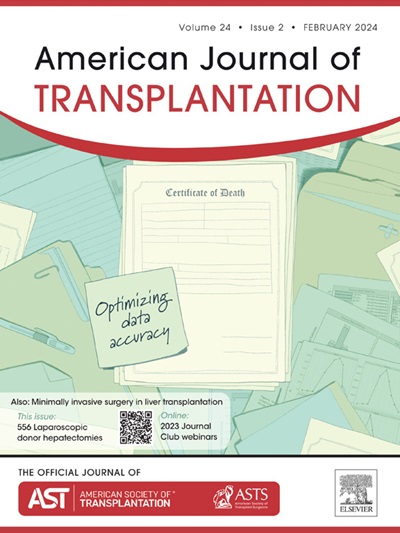Outcomes and motivations in unspecified (nondirected altruistic) kidney donation: Results from a United Kingdom prospective cohort study
IF 8.2
2区 医学
Q1 SURGERY
引用次数: 0
Abstract
Unspecified kidney donors (UKDs) increase the number of high-quality kidneys available for transplantation. This study aimed to determine whether the practice was acceptable, based on the noninferiority of donor physical and psychosocial outcomes when compared to specified kidney donors (SKDs). This longitudinal, prospective cohort study investigated potential living kidney donors from across all 23 UK adult kidney transplant centers. Participants completed validated questionnaires at 4 time points (recruitment, 2-4 weeks predonation, 3- and 12-months postdonation). Clinical outcome data were collected from National Health Service Blood and Transplant. Three hundred seventy-three (of 837 recruited; 45.7%) went on to donate (November 2016 to January 2021). There were no differences in donation rates (204 SKDs [54.7%] vs 169 UKDs [45.3%]; P = .944). Both groups reported being motivated by the desire to help someone (P = .157). Tests for noninferiority indicated that UKDs do no worse than SKDs on psychosocial or clinical outcomes over 12 months, and costs are similar (P > .05). This is the world’s largest prospective observational study comparing SKDs and UKDs. It demonstrates no differences in primary motivation, donation rates, regret, cost, or psychosocial and physical outcomes. These data should reassure transplant professionals and potential donors and can bolster confidence in the practice around the world.
未指明(非定向利他)肾脏捐赠的结果和动机:来自英国前瞻性队列研究的结果。
未指定肾脏供体(UKDs)增加了可用于移植的高质量肾脏的数量。本研究旨在确定这种做法是否可接受,基于与特定肾脏供者(skd)相比,供者的身体和社会心理结果的非劣效性。一项纵向前瞻性队列研究调查了来自英国所有23个成人肾脏移植中心的潜在活体肾脏捐赠者。参与者在四个时间点(招募、捐赠前2-4周、捐赠后3个月和12个月)完成有效问卷。临床结果数据收集自NHS血液和移植。45.7%)继续捐赠(2016年11月至2021年1月)。捐献率无差异(204 skd (54.7%) vs 169 UKDs (45.3%);p = 0.944)。两组人都被帮助他人的愿望所激励(p=0.157)。非劣效性测试表明,在12个月的时间里,ukd在心理社会或临床结果上并不比skd差,而且成本相似(p < 0.05)。这是世界上最大的比较skd和ukd的前瞻性观察性研究。研究表明,在主要动机、捐赠率、后悔、成本或社会心理和身体结果方面没有差异。这些数据应该让移植专业人员和潜在捐赠者放心,并可以增强全世界对移植实践的信心。
本文章由计算机程序翻译,如有差异,请以英文原文为准。
求助全文
约1分钟内获得全文
求助全文
来源期刊
CiteScore
18.70
自引率
4.50%
发文量
346
审稿时长
26 days
期刊介绍:
The American Journal of Transplantation is a leading journal in the field of transplantation. It serves as a forum for debate and reassessment, an agent of change, and a major platform for promoting understanding, improving results, and advancing science. Published monthly, it provides an essential resource for researchers and clinicians worldwide.
The journal publishes original articles, case reports, invited reviews, letters to the editor, critical reviews, news features, consensus documents, and guidelines over 12 issues a year. It covers all major subject areas in transplantation, including thoracic (heart, lung), abdominal (kidney, liver, pancreas, islets), tissue and stem cell transplantation, organ and tissue donation and preservation, tissue injury, repair, inflammation, and aging, histocompatibility, drugs and pharmacology, graft survival, and prevention of graft dysfunction and failure. It also explores ethical and social issues in the field.

 求助内容:
求助内容: 应助结果提醒方式:
应助结果提醒方式:


